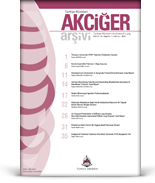Objective: The incidence of pulmonary embolism (PE) has increased in coronavirus disease-2019 (COVID-19) infection. The aim of study is to determine whether there is an increase in the frequency of PE in asymptomatic COVID-19 patients. Material and Methods: Patients who were diagnosed with PE our hospital, who did not have COVID-19 and who were not vaccinated against COVID-19 were included in the study group and severe acute respiratory syndrome-coronavirus-2 (SARS-CoV-2) antibody levels were examined. The control group was consisted of patients who did not have PE, had not had COVID-19 and were not vaccinated and SARSCoV-2 antibody levels were examined. The antibody positivity rates, antibody titer levels of both groups were compared. Results: A total of 32 patients, 16 in the study group and 16 in the control group, were included in the study. Of all patients, 22 (68.8%) were male, 10 (31.3%) were female. While the mean age of men was 47.36±14.86, women was 51±24.463 (p=0.671). There was no statistically difference between the 2 groups in terms of mean age (p=0.346). When the groups were compared in terms of SARS-CoV-2 antibody, antibody positivity was found in 7 (43.8%) patients in both the study group and the control group (p=1.000). There wasn't difference between the groups antibody titers (p=0.275). The rate of asymptomatic COVID19 infection in patients with PE was found to be similar to the population followed with non-PE diagnoses. Conclusion: The results of study show that there is no increase in the risk of PE in patients with asymptomatic COVID-19 infection.
Keywords: COVID-19; pulmonery embolism
Amaç: Koronavirüs hastalığı-2019 (COVID-19) enfeksiyonunda pulmoner emboli (PE) insidansı artmıştır. Çalışmanın amacı asemptomatik COVID-19 hastalarında PE sıklığında artış olup olmadığını belirlemektir. Gereç ve Yöntemler: Hastanemizde PE tanısı alan, COVID-19 olmayan ve COVID-19 aşısı olmayan hastalar çalışma grubuna alındı ve şiddetli akut solunum sendromu-koronavirüs-2 (SARS-CoV)-2) antikor seviyelerine bakıldı. Kontrol grubu PE olmayan, COVID-19 geçirmemiş ve aşılanmamış hastalardan oluşturuldu ve SARS-CoV-2 antikor düzeyleri bakıldı. Her iki grubun antikor pozitiflik oranları, antikor titre düzeyleri karşılaştırıldı. Bulgular: Çalışma grubuna 16, kontrol grubuna 16 olmak üzere toplam 32 hasta dahil edildi. Tüm hastaların 22'si (%68,8) erkek, 10'u (%31,3) kadındı. Erkeklerin yaş ortalaması 47,36±14,86 iken kadınların 51±24,463'tür (p=0,671). Yaş ortalamaları açısından 2 grup arasında istatistiksel olarak fark yoktu (p=0,346). Gruplar SARS-CoV-2 antikoru açısından karşılaştırıldığında hem çalışma grubunda hem de kontrol grubunda 7 (%43,8) hastada antikor pozitifliği saptandı (p=1.000). Gruplar arasında antikor titreleri arasında fark yoktu (p=0,275). PE'li hastalarda asemptomatik COVID-19 enfeksiyonu oranı, PE olmayan tanılarla takip edilen popülasyona benzer bulundu. Sonuç: Çalışmanın sonuçları asemptomatik COVID-19 enfeksiyonu olan hastalarda PE riskinde artış olmadığını göstermektedir.
Anahtar Kelimeler: COVID-19; pulmoner emboli
- Uddin M, Mustafa F, Rizvi TA, Loney T, Suwaidi HA, Al-Marzouqi AHH, et al. SARS-CoV-2/COVID-19: viral genomics, epidemiology, vaccines, and therapeutic interventions. Viruses. 2020;12(5):526. [Crossref] [PubMed] [PMC]
- Giannis D, Ziogas IA, Gianni P. Coagulation disorders in coronavirus infected patients: COVID-19, SARS-CoV-1, MERS-CoV and lessons from the past. J Clin Virol. 2020;127:104362. [Crossref] [PubMed] [PMC]
- Hanff TC, Mohareb AM, Giri J, Cohen JB, Chirinos JA. Thrombosis in COVID-19. Am J Hematol. 2020;95(12):1578-89. [Crossref] [PubMed] [PMC]
- Levi M, Thachil J, Iba T, Levy JH. Coagulation abnormalities and thrombosis in patients with COVID-19. Lancet Haematol. 2020;7(6):e438-e40. [Crossref] [PubMed] [PMC]
- Klok FA, Kruip MJHA, van der Meer NJM, Arbous MS, Gommers D, Kant KM, et al. Confirmation of the high cumulative incidence of thrombotic complications in critically ill ICU patients with COVID-19: An updated analysis. Thromb Res. 2020;191:148-50. [Crossref] [PubMed] [PMC]
- Tan BK, Mainbourg S, Friggeri A, Bertoletti L, Douplat M, Dargaud Y, et al. Arterial and venous thromboembolism in COVID-19: a study-level meta-analysis. Thorax. 2021;76(10):970-9. [Crossref] [PubMed] [PMC]
- Elecsys® Anti-SARS-CoV-2 S Assay Method Sheet 09289267501 V2.0. Available from: [Link]
- Gong X, Yuan B, Yuan Y. Incidence and prognostic value of pulmonary embolism in COVID-19: A systematic review and meta-analysis. PLoS One. 2022;17(3):e0263580. [Crossref] [PubMed] [PMC]
- Kyriakoulis KG, Kollias A, Kyriakoulis IG, Kyprianou IA, Papachrysostomou C, Makaronis P, et al. Thromboprophylaxis in patients with COVID-19: Systematic Review of National and International Clinical Guidance Reports. Curr Vasc Pharmacol. 2022;20(1):96-110. [Crossref] [PubMed]
- Alharthy A, Balhamar A, Faqihi F, Alshaya R, Noor A, Alaklobi F, et al. Insidious development of pulmonary embolism in asymptomatic patients with COVID-19: Two rare case-reports. Respir Med Case Rep. 2020;31:101186. [Crossref] [PubMed] [PMC]
- Nonno FD, Colombo D, Nardacci R, Falasca L. Fatal pulmonary arterial thrombosis in a COVID-19 patient, with asymptomatic history, occurred after swab negativization. Thrombosis Journal. 2021;19:1. [Crossref] [PubMed] [PMC]
- Keane G, Dorman T. Fatal pulmonary thromboembolism in asymptomatic COVID-19. Ir J Med Sci. 2022;191(4):1777-83. [Crossref] [PubMed] [PMC]
- Appenzeller F, Schmehl J, Gawaz M, Müller I. Extensive thromboembolism in a young male with asymptomatic COVID-19 infection and heterozygous factor V leiden mutation. Hamostaseologie. 2021;41(5):400-2. [Crossref] [PubMed]







.: Process List